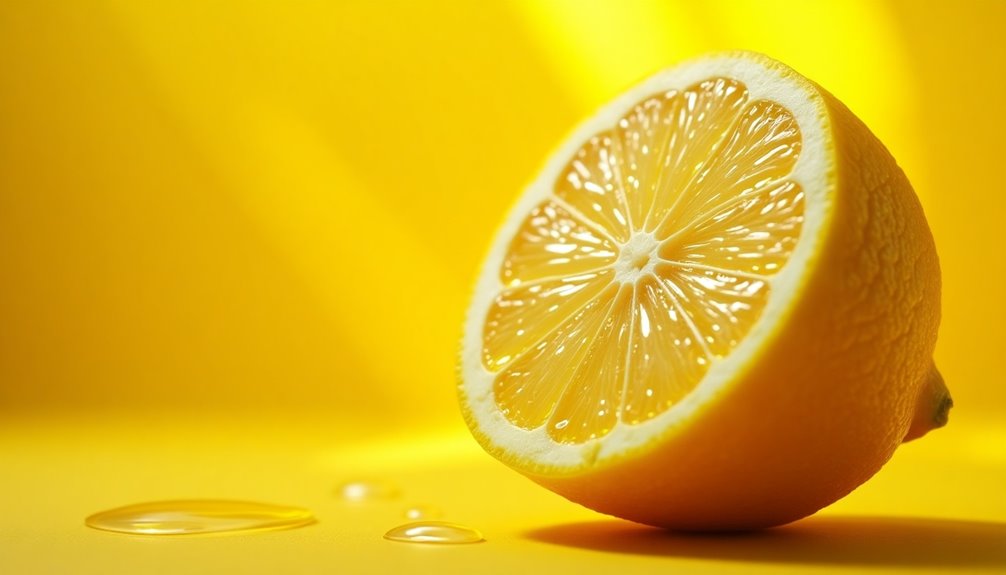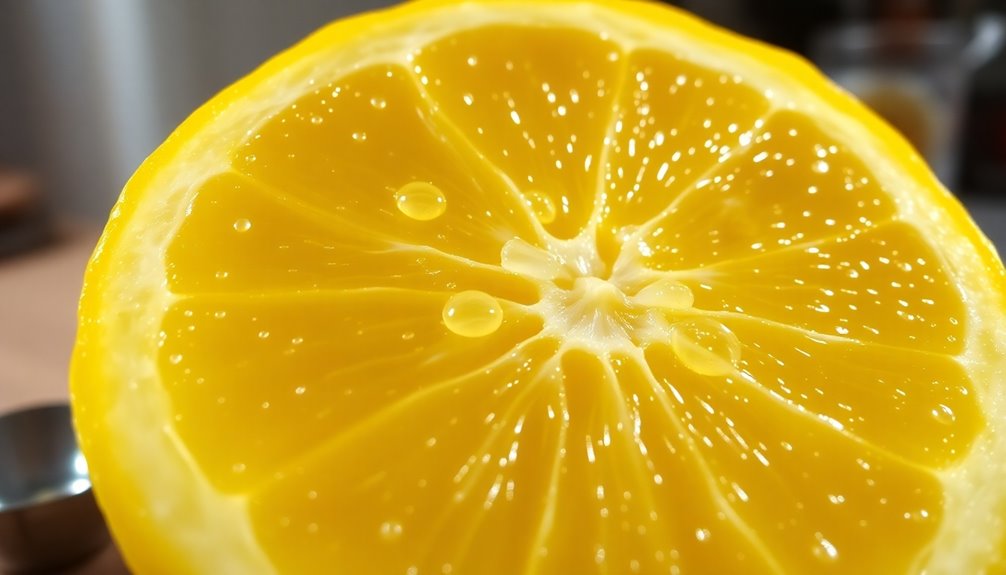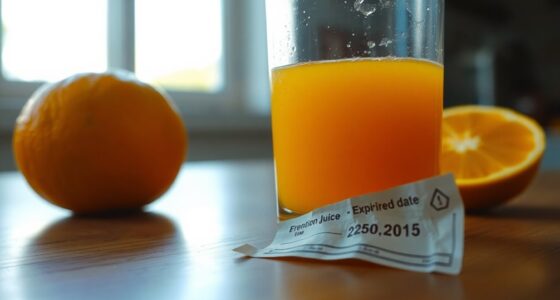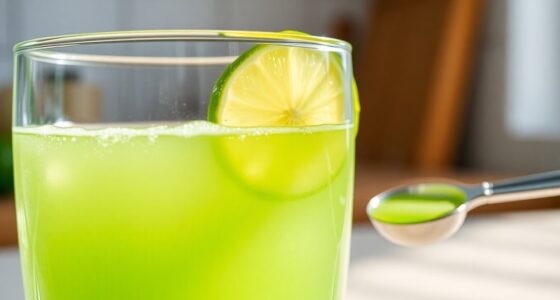A medium lemon typically has about 2 to 3 tablespoons of juice, with an average yield of around 3 tablespoons. If you need a full cup of lemon juice, you'll want to use about 5.25 to 5.5 medium lemons. Remember, larger lemons can give you up to a quarter cup, while seasonal variations can affect juiciness. Knowing these details can help you use lemons more effectively in your recipes. There's so much more to discover about lemons!
Key Takeaways
- A medium lemon typically yields about 2 to 3 tablespoons of juice, averaging around 3 tablespoons per lemon.
- For a full cup of lemon juice, you need approximately 5.25 to 5.5 medium lemons.
- Larger lemons can produce up to a quarter cup (4 tablespoons) of juice.
- Seasonal variations can affect juice yield, with summer lemons generally being juicier than winter lemons.
- Individual lemon characteristics, such as variety and growing conditions, influence the amount of juice extracted.

When you're squeezing a medium lemon, you can expect to get about 2 to 3 tablespoons of juice, with 3 tablespoons being the average. This amount is often sufficient for many recipes that call for fresh lemon juice. If you've ever found yourself wondering how much juice is in one lemon, it's essential to remember that this yield can vary. While a medium lemon consistently provides a reliable amount, the juice of one lemon can differ based on various factors.
If you’re planning to make a dish that requires an entire cup of lemon juice, you’ll need approximately 5. 25 to 5. 5 medium lemons. Keeping this in mind can help you avoid any unpleasant surprises while cooking or baking. If you’re using larger lemons, you might find that they can yield even more juice, sometimes producing up to a quarter cup, or 4 tablespoons. This can really come in handy when you’re preparing recipes that require a significant amount of lemon juice. When it comes to understanding how to measure lemon juice accurately, using a liquid measuring cup is essential for precision. Squeeze the lemons and strain the juice to remove any seeds or pulp for a smooth texture. Additionally, knowing how to measure lemon juice can save you time and ensure that your dish has the perfect zesty flavor you’re aiming for.
Seasonal variations also play a significant role in how much juice you can extract from a lemon. Typically, lemons harvested in summer tend to be juicier than those picked in winter. This means that if you're sourcing lemons during peak season, you can generally expect a higher lemon yield. On the other hand, if you've got winter lemons, you might need to squeeze a couple more to achieve the same amount of juice. Being aware of these seasonal changes can help you make better choices while shopping for your citrus fruit.
Individual lemon characteristics are another factor that can affect juice output. Different varieties of lemons have distinct properties that influence their juiciness. For example, some lemons are bred specifically for their higher juice content, while others may be firmer and yield less. Additionally, growing conditions like soil quality and climate can impact how juicy a lemon becomes. Therefore, it's always a good idea to measure based on the specific lemon you're using to ensure accuracy in your recipes.
When you're preparing a dish that calls for fresh lemon juice, understanding these factors can save you time and effort. If you have a collection of lemons at home, try squeezing a few to see how much juice each one produces. This exercise not only gives you a better grasp of how much juice you can expect but also helps you appreciate the nuances of each lemon.
Whether you're whipping up a zesty salad dressing or a tangy dessert, knowing the average yield of a medium lemon can greatly enhance your cooking experience. Remember, fresh lemon juice can elevate your dishes, and being aware of how much juice to expect from your lemons will help you use them more effectively in your culinary creations.
Frequently Asked Questions
How Much Juice Do You Get From One Lemon?
When you squeeze a medium lemon, you typically get about 2 to 3 tablespoons of juice.
However, this can vary depending on the lemon's size and ripeness. If you're using larger lemons, you might even extract up to 4 tablespoons.
Can You Substitute Bottled Lemon Juice for Fresh Lemon Juice?
Imagine biting into a dish that bursts with freshness; that's the magic of fresh lemon juice!
While you can substitute bottled lemon juice for fresh, it often falls short in flavor and health benefits.
Bottled versions contain preservatives and may lack that vibrant tang you crave.
If you're in a pinch, use it, but don't hesitate to adjust based on your taste.
Fresh juice truly elevates your recipes, bringing them to life.
Is 2 Lemons a Day Too Much?
Consuming two lemons a day isn't too much for most people, as they provide a good source of vitamin C and other health benefits.
However, you should consider your individual tolerance; some may experience stomach discomfort or dental issues due to the acidity.
If you've got acid reflux or citrus allergies, it's best to consult a healthcare professional.
Balance your lemon intake with other foods and drinks to maintain a healthy diet.
How Much Real Lemon Juice Equals One Lemon?
When you're measuring lemon juice, one medium lemon generally equals about 3 tablespoons.
If you need a cup of juice, you'll want to grab around 5 to 5.5 medium lemons.
Keep in mind that the juice yield can vary based on the lemon's size and ripeness.
If you're using larger lemons, they might give you up to 1/4 cup of juice, so adjust your measurements accordingly for your recipe.
Conclusion
In conclusion, you're probably surprised to learn that one medium lemon typically yields about 2 to 3 tablespoons of juice. That's around 1 ounce! So next time you're whipping up a recipe or making a refreshing drink, remember that a single lemon can pack quite a punch. Not only does it add flavor, but the acidity also brightens up your dishes. So, don't underestimate the power of this small citrus fruit—it's a kitchen essential!
Cindy thoroughly researches juicing trends, techniques, and recipes to provide readers with practical advice and inspiration. Her writing style is accessible, engaging, and designed to make complex concepts easy to understand. Cindy’s dedication to promoting the advantages of juicing shines through her work, empowering readers to make positive changes in their lives through the simple act of juicing.

















